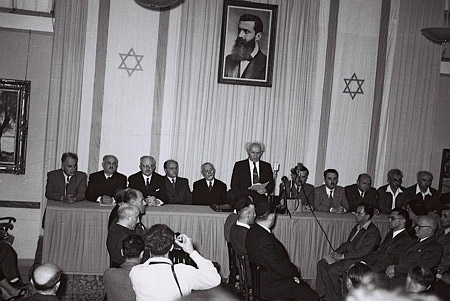In 1947, responding to England's request to end the Mandate of Palestine which was becoming increasingly costly for the Kingdom, financially and politically, the United Nations gathered for a general assembly with regard to the future status of Palestine. The idea was to carry on the idea of Partitioning the land as was the intention under the Balfour Declaration. However, since Trans-Jordan had been declared the sovereign Hashemite kingdom of Jordan in 1946, there was not much land left to partition. The idea was to establish two states that could operate together to form an Economic Union. This was an attempt to resolve the conflict between Jews and Arabs without acknowledging that Jordan was in fact the Arab State meant to exist side by side with the Jewish state.
The Arab states refused to accept any Jewish presence in the region, and a campaign of pressure was placed on the United Nations, with threats to the Western States that implied the much-needed oil coming out of the region would stop if the entirety of Palestine were given to the Jews. Caving to the pressure, and billed as a compromise, the United Nations came up with a partition plan for the area comprising Judea, Samaria, the Galilee, and the Negev, all land that was to have been the Jewish state. The plan stated that the region would be divided into three major sections, one Jewish, one Arab, and one International to ensure freedom of worship for all in the holy cities of Jerusalem, Hebron, and Bethlehem. The Arab leaders rejected the partition. The Arab leaders believed that the people should develop self-government under one administration. This prompted Arabs to resort to violence. Skirmishes in the vain of pogroms against Jews broke out throughout the land and soon became prevalent throughout the region. Dozens of Jews were murdered throughout the country and initially, no outside forces intervened to put a stop to the escalating barbarity. Then the Jews began to fight back.
The violence escalated into a war when the British withdrew from Palestine. Soon after, Jewish leaders declared the independence of the State of Israel on the sliver of land that the United Nations had allocated toward a Jewish State. The Jews, now calling themselves Israeli for the first time in millennia, proclaimed statehood on May 14th, 1948. The Arab communities in Palestine, under orders from Arab leaders in Egypt, Syria, Iraq, and Jordan erupted and thus began what could only be described as a Civil War. In the first two months, over 1,000 people were killed and 2000 were injured. This number would rise with an average of 100 deaths and 200 injuries per week. From there onwards, the Israeli state became highly militarized. Haganah members attempted to bring tanks and supplies to aid Israeli military efforts and many were killed in their attempts to do so. As the Jews held their ground, over 100,000 Arabs from the urban areas of Israel evacuated to Arab states abroad in the east.
The second stage of the war was primarily focused on an Israeli-born plan called 'Plan Dalet' in which the Haganah took the offensive. This marked Haganah’s success in ensuring that the Jews caught in Arab-controlled Jerusalem had at least two months' worth of food. With the aid of the Haganah, once mixed population zones such as Tiberias, Haifa, Safed, Beisan, and Jaffa, from where many of the offenses against Jews were orchestrated, were taken by the Jews. This resulted in over 250,000 Arabs fleeing from these areas. The Arab forces were not well equipped and the resolve of the Arab fighters was non-existent. Predictions for the upcoming battle in Jerusalem favored the Israeli forces.
By the end of May 1948, many Arab states joined forces to fight the Israelis but found that their coordination was very poor. Fearing a massacre of the Arab forces, the United Nations stepped in and initiated a truce. With the Israelis standing down, the Arabs took advantage and violated the ceasefire. The now well-equipped Israeli army fought back, forcing the Egyptian soldiers into the Gaza strip and was continuing to push into Sinai until the British Army, fearful of losing control of the Suez canal, threatened to join the fight against the Israelis to defend the Egyptian positions. In 1949, Israel signed an armistice with Egypt and as a result was able to claim 78% of the land of Israel, almost doubling the initial land apportioned by the original United Nations partition plan.


